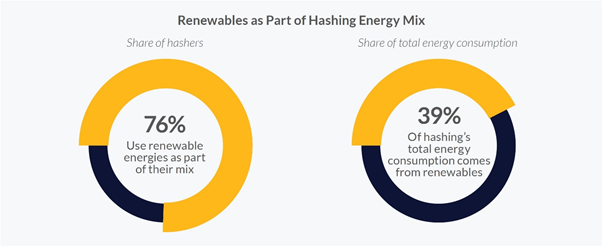The truth behind Bitcoin energy consumption
On May 13th, Elon Musk claimed that Tesla will not accept Bitcoin as a payment method due to its increasing use of fossil fuels in Bitcoin mining and transactions. His opinion got good responses from environmental activists, however, is it true? Let’s take a look at Tokenize Exchange’s analysis to find out why his claim is misleading us about Bitcoin energy consumption.
What happened after Elon Musk’s tweet
“Tesla has suspended vehicle purchases using Bitcoin,” said Elon Musk, citing excessive Bitcoin mining energy consumption. Musk has been known as one of the biggest supporters of digital coins who helped rally the prices of cryptocurrencies, including bitcoin, several times in the past year. It was revealed Tesla bought $1.5 billion worth of bitcoin. However, his concern over the “rapidly increasing use of fossil fuels for bitcoin mining” leads to a 10% decrease in Bitcoin price, so did Tesla shares.

“He’s playing games. It is hard to take anyone who does that seriously. I’ve lost enormous respect for him over the last year because of it” said Fred Wilson, a founding partner of Union Square Ventures. He added, “Deep respect for what he does with his talents. Less for what he does with his tweets.”
The move away from the lucrative cryptocurrency saw its price significantly dropped. But how can digital coin harm the environment or is it an attempt by Tesla CEO to manipulate the crypto market?
How much energy do Bitcoin mining and transaction actually consume?
According to the Cambridge Bitcoin Power Consumption Index (CBECI) researched by scientists from the University of Cambridge (UK), the total Bitcoin mining energy consumption this year could reach tWH 144.28. This represents 0.6% of the world’s total electricity production and is similar to small countries like Norway, Sweden, and Malaysia. That sounds like a huge amount of energy, however, is it such a strong proof of Bitcoin energy consumption and a “great cost to the environment” as Tesla CEO claims?
How is Bitcoin energy consumption misleading?
Energy consumption is not the same as fuel consumption and carbon emissions
There is a difference between how much energy is needed in Bitcoin mining and how much carbon it emits. In fact, fuel energy (oil, gas, and coal-powered) is not the only source to generate electricity among several sources (hydro, solar, wind, and nuclear energy). For example, one unit of hydro energy will have a much less environmental negative impact than the same unit of coal-powered energy.
Source: Cambridge Centre for Alternative Finance
Hence, it can be said the amount of non-renewable energy sources will keep decreasing in the future, leading to lower carbon emissions.
Bitcoin can use the wasted energy
While other industries need to be placed near its users to save transportation costs, Bitcoin has no boundary. Produced based on Blockchain technology. A key factor that makes Bitcoin’s energy consumption different from that of most other industries is that Bitcoin can be mined anywhere and consume the local excess energy.
Hydro is the most well-known example. According to Harvard Business Review, In the wet season in Sichuan and Yunnan, enormous quantities of renewable hydro energy are wasted every year. The amount of power is larger than the demand of the local citizens and industry, however, the technology does not support storing or transporting the power to other regions. Sichuan and Yunnan are one of the centers of Bitcoin mining with almost 10% of the global Bitcoin mining hash rate in the dry season and 50% in the wet season.
Source: Cambridge Centre for Alternative Finance
The rest of the hashrate share was in Xinjiang and Inner Mongolia, where coal-powered energy is prevalent. However, operations in Inner Mongolia have been forced to shut down, and Xinjiang has been moving toward renewable energy.
The future for Bitcoin mining
According to Ark CEO Cathie Wood, Bitcoin mining can help the environment by speeding the world’s transition to renewable energy. “Solar roofs, power walls in homes, utility merging power producers start to include Bitcoin mining in the ecosystem.” Said Ms. Wood.
Renewable energies are intermittent and the Bitcoin mining process can take the excess power from solar energy and hydro energy. And the whole ecosystem, therefore, becomes much more economic. She believes that the adoption of solar will be accelerated dramatically because there is another profit center associated with Bitcoin mining.
In conclusion
It cannot be denied that Bitcoin mining is consuming a large amount of energy. However, the impact is less alarming than it seems. The concern, therefore, will not be “Is Bitcoin worth its environmental footprint” but “How to make Bitcoin greener?” Due to the demand for green energy, utility companies will be stimulated to expand their renewable energy capacity to run the world 100% on clean energy. Hence, there are reasons to believe that Bitcoin will consume more renewable resources in the future and become a green currency.
Subscribe to Tokenize Blog
Get updated with our guides, tips, and market news to help you in your investment.
Follow Tokenize Exchange on Facebook, Telegram, Medium, Twitter, Instagram.
Disclaimer
Cryptocurrencies are subjected to high market risk and volatility despite high growth potential. Users are strongly advised to do their research and invest at their own risk.






